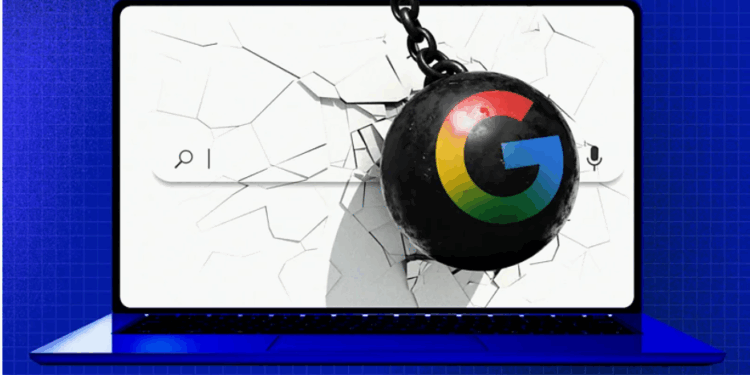Google claims its new AI tool for search will rejuvenate the internet, but critics warn it could signal the end for many websites. This marks a pivotal moment in online history, ushering in what some are calling the “machine web.”
The current web operates on a simple premise: websites allow search engines like Google to access their content for free, and in return, Google directs traffic to these sites, which monetarily benefit from visitors. Approximately 68% of internet activity begins with search engines, and about 90% of searches are conducted on Google. If the internet is a garden, Google is the sun that helps it thrive.
However, a seemingly minor change has raised alarms about the stability of this system. Google is rolling out a new AI feature that, while potentially useful, could drastically alter the internet landscape. Critics fear that quality information may become scarcer and that many jobs could be at risk. Optimists argue that this could enhance the web’s business model and improve content discovery, but one thing is certain: digital experiences may never be the same.
On May 20, 2025, Google CEO Sundar Pichai announced at the company’s annual developer conference that they are launching an “AI Mode,” a complete reimagining of search. Unlike the existing AI Overviews, which provide brief responses, AI Mode will replace traditional search results with a chatbot that generates comprehensive answers.
Currently optional, AI Mode is being introduced to users in the U.S. Critics worry that if AI Mode becomes the default, it will further diminish traffic to websites—traffic that has already decreased due to AI Overviews. Lily Ray, VP of SEO strategy at Amsive, warns that this could severely impact publishers’ primary revenue sources.
Google contends that these concerns are exaggerated, asserting that AI Mode will enhance the web. A spokesperson stated, “Every day, we send billions of clicks to websites,” emphasizing that new AI features will create opportunities for content discovery.
Despite this, both Google and its critics agree: the internet is on the brink of significant change. The next year could mark the end of a digital era, leaving us to wonder what will emerge from the upheaval.
The Publisher’s Concern
While the internet itself is not disappearing—social media and paywalled sites are thriving—the way people discover information is set to change dramatically. Many fear the “open web,” characterized by freely accessible independent sites, is at risk.
Past predictions, such as Wired magazine’s 2010 claim that “the web is dead,” have proven unfounded. Yet experts warn that AI Mode poses a unique threat to the digital economy. Barry Adams, founder of Polemic Digital, suggests “decimation” is more accurate than “extinction” when describing the potential impact on websites.
Google maintains that AI Overviews and AI Mode will diversify traffic and improve user experience. However, the company has not provided data to support these claims, nor has it clarified how these AI tools affect website traffic. Critics argue that if AI can answer queries directly, users may have little reason to click on links.
Data indicates that AI Overviews have reduced click-through rates by 30% to 70% and that around 60% of searches result in “zero-click” outcomes, where users do not visit any links.
For many, the shift to a “machine web” could lead to less diversity in online information and a diminishing sense of community. Gisele Navarro, managing editor of HouseFresh, argues that the web’s richness may decline as AI-driven responses replace the serendipity of exploration.
A Google spokesperson disputes these concerns, stating that the company prioritizes the health of the web and that content volume has increased by 45% in the last two years.
Small publishers like HouseFresh are already feeling the pressure from AI’s rise, with Navarro noting an increase in impressions but a decline in clicks, likely due to users obtaining answers from AI rather than visiting websites.
The potential for AI Mode to become the default could further exacerbate these issues, making it harder for publishers to sustain their businesses.
The emergence of the “machine web” could fundamentally alter how users interact with information online. Demis Hassabis, head of Google DeepMind, suggests that publishers might start feeding content directly to AI models, potentially sidelining traditional web formats.
Matthew Prince, CEO of Cloudflare, warns that if AI becomes the primary audience, creators may struggle to monetize their work. Direct compensation models are being explored, but they currently favor larger publishers.
While some users may turn to social media for content, others worry that this shift will lead to lower quality information. Despite potential changes, experts remain cautiously optimistic that innovation will emerge from challenges faced by the open web.
ICYMI: Stormzy launches Film Company and stars in debut short film
As users adapt to these new technologies, the future of the web remains uncertain. Google insists that it will continue to direct traffic to websites, but many are left wondering what that future will look like for users and publishers alike.
In conclusion, as AI tools become more integrated into search engines, the landscape of the internet is poised to change dramatically. The question remains: will this transformation enhance or diminish the richness of our online experiences?
SOURCE: BBC


























